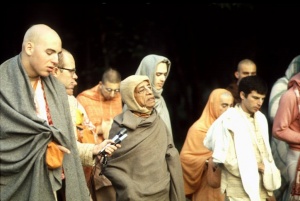CC Antya 2.96: Difference between revisions
No edit summary |
(Vanibot #0054 edit - transform synonyms into clickable links, which search similar occurrences) |
||
| Line 17: | Line 17: | ||
<div class="synonyms"> | <div class="synonyms"> | ||
''mahā-bhāgavata yei'' | ''[//vanipedia.org/wiki/Special:VaniSearch?s=mahā&tab=syno_o&ds=1 mahā]-[//vanipedia.org/wiki/Special:VaniSearch?s=bhāgavata&tab=syno_o&ds=1 bhāgavata] [//vanipedia.org/wiki/Special:VaniSearch?s=yei&tab=syno_o&ds=1 yei]'' — one who is a highly elevated devotee; ''[//vanipedia.org/wiki/Special:VaniSearch?s=kṛṣṇa&tab=syno_o&ds=1 kṛṣṇa]'' — Lord Kṛṣṇa; ''[//vanipedia.org/wiki/Special:VaniSearch?s=prāṇa&tab=syno_o&ds=1 prāṇa]-[//vanipedia.org/wiki/Special:VaniSearch?s=dhana&tab=syno_o&ds=1 dhana] [//vanipedia.org/wiki/Special:VaniSearch?s=yāra&tab=syno_o&ds=1 yāra]'' — whose life and soul; ''[//vanipedia.org/wiki/Special:VaniSearch?s=māyāvāda&tab=syno_o&ds=1 māyāvāda]-[//vanipedia.org/wiki/Special:VaniSearch?s=śravaṇe&tab=syno_o&ds=1 śravaṇe]'' — by hearing the Māyāvāda philosophy; ''[//vanipedia.org/wiki/Special:VaniSearch?s=citta&tab=syno_o&ds=1 citta]'' — the heart; ''[//vanipedia.org/wiki/Special:VaniSearch?s=avaśya&tab=syno_o&ds=1 avaśya]'' — certainly; ''[//vanipedia.org/wiki/Special:VaniSearch?s=phire&tab=syno_o&ds=1 phire]'' — changes; ''[//vanipedia.org/wiki/Special:VaniSearch?s=tāṅra&tab=syno_o&ds=1 tāṅra]'' — his. | ||
</div> | </div> | ||
Latest revision as of 20:16, 19 February 2024

His Divine Grace
A.C. Bhaktivedanta Swami Prabhupada
A.C. Bhaktivedanta Swami Prabhupada
TEXT 96
- mahā-bhāgavata yei, kṛṣṇa prāṇa-dhana yāra
- māyāvāda-śravaṇe citta avaśya phire tāṅra“
SYNONYMS
mahā-bhāgavata yei — one who is a highly elevated devotee; kṛṣṇa — Lord Kṛṣṇa; prāṇa-dhana yāra — whose life and soul; māyāvāda-śravaṇe — by hearing the Māyāvāda philosophy; citta — the heart; avaśya — certainly; phire — changes; tāṅra — his.
TRANSLATION
“The Māyāvāda philosophy presents such a jugglery of words that even a highly elevated devotee who has accepted Kṛṣṇa as his life and soul changes his decision when he reads the Māyāvāda commentary on the Vedānta-sūtra.”